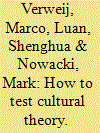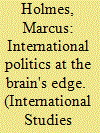| Srl | Item |
| 1 |
ID:
110656


|
|
|
|
|
| Publication |
2011.
|
| Summary/Abstract |
This symposium highlighted the relevance of the cultural theory (CT) pioneered by anthropologists Mary Douglas, Steve Rayner, and Michael Thompson and political scientists Aaron Wildavsky and Richard Ellis for explaining political phenomena. In this concluding article, we suggest ways in which CT can be further tested and developed. First, we describe how the theory has been applied thus far and some of the achievements of these applications. Then, we examine some of the challenges revealed by this research. Finally, we discuss ways of applying CT that promise to help meet these challenges. These methods include nesting case studies and combining case study and survey research, simulations, experiments, and approaches from social neuroscience.
|
|
|
|
|
|
|
|
|
|
|
|
|
|
|
|
| 2 |
ID:
132374


|
|
|
|
|
| Publication |
2014.
|
| Summary/Abstract |
Social neuroscience has seen a profound rise in other social science disciplines, such as economics, yet there has been relatively little systematic analysis of the usefulness of social neuroscience for international relations and the study of world politics. This article suggests that while there are many potential explanations for why this might be the case, one important barrier to adopting neuroscience may be our metaphysical assumptions and philosophical wagers. I suggest that if all politics is rooted in the brain, then two distinct arguments regarding agent-structure are plausible. One argument suggests that structure becomes redundant once the brain is accounted for; the other suggests that the brain simply drops out as epiphenomenal. After all, if all politics is reflected in the brain, then the brain itself is less interesting than the structure being reflected. These wagers ultimately relate to positions we take on the mind-body problem and well-known ideational-material divide. New research in neuroscience and philosophy of mind suggests that this binary distinction can be overcome, suggesting a new "via media" between ideas and material that may offer significant promise for both theory and practice.
|
|
|
|
|
|
|
|
|
|
|
|
|
|
|
|